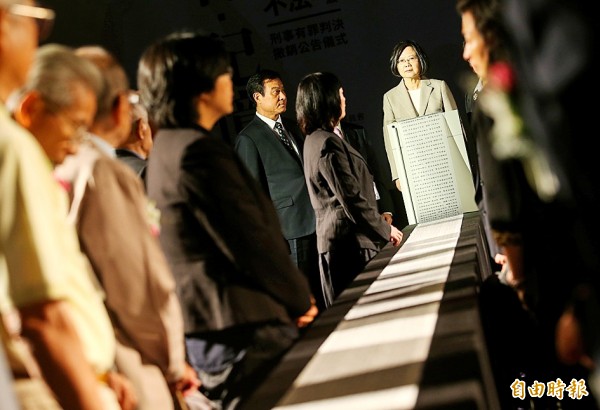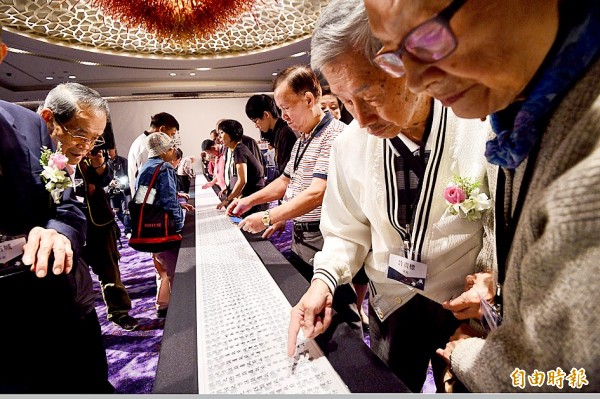《TAIPEI TIMES》 Commission exonerates 1,270 people

President Tsai Ing-wen, center, oversees a ceremony at the Sheraton Grand Taipei Hotel yesterday. Photo: CNA
TRANSITIONAL JUSTICE: Wu Sheng-jun, who was sentenced during the White Terror era, thanked the government for repealing convictions that had disgraced people
By Sean Lin / Staff reporter
The Transitional Justice Commission yesterday exonerated 1,270 people who were convicted after the 228 Incident, with commission Chairman Huang Huang-hsiung (黃煌雄) touting the move as “a small, but significant step toward realizing transitional justice.”
The commission held a news conference at the Sheraton Grand Taipei Hotel, which was attended by people who were wrongfully or unjustly tried during the White Terror era, as well as family members of those who have died.
President Tsai Ing-wen (蔡英文), Premier William Lai (賴清德), Legislative Speaker Su Jia-chyuan (蘇嘉全) and Control Yuan President Chang Po-ya (張博雅) also attended the news conference, which featured speeches by people affected by the 228 Incident and the White Terror era.
Chung Yi-jen (鍾逸人), 98, said he was arrested during the 228 Incident when he was 26 for trying to protect his hometown of Taichung against the “corrupt” officials and troops Chiang Kai-shek (蔣介石) sent from China, who “bullied and slaughtered” Taiwanese.
“I did not break the law. I was just a Taiwanese trying to defend his country,” Chung said, expressing his gratitude to Tsai for “restoring people’s reputations.”
The Chinese Nationalist Party (KMT) gained control of Taiwan after World War II and in 1947 sparked the 228 Incident, which ushered in the White Terror era after Chiang dispatched legions of troops to Taiwan to quash the uprising.
Chiang in 1949, the same year he imposed martial law, retreated to Taiwan with the KMT after its defeat in the Chinese Civil War.
Wu Sheng-jun (吳聲潤), who was sentenced to 12 years in prison for making grenades for a rebel group, said he still weeps when he thinks about his lost friends, who were bludgeoned to death by the then-KMT regime, many of whom he said loved their country and were outstanding people.
Wu, 95, said the US saved Chiang’s life by deploying the US Seventh Fleet to help defend Taiwan after the Korean War, but Chiang was arresting and killing Taiwanese.
Wu thanked Tsai and the “indigenous” government she leads for repealing the unjust convictions imposed on “ill-fated” Taiwanese who until then had been living in disgrace.
Taiwan experienced a dark age before it was democratized, with some people not understanding why they were interrogated or were to be executed, Tsai said.
“Many people and their families spent most of their lives in the hope of redress,” Tsai said. “Although the government conferred certificates to warrant the restoration of their reputations, the erroneous convictions were never repealed.”
Apologizing to those who did not live to witness their exoneration, as well as their families, Tsai said the day came late, “but it is better late than never.”
The president thanked the Legislative Yuan for passing the Act on Promoting Transitional Justice (促進轉型正義條例), without which the exonerations could not have been granted.
She called on the commission to continue to solemnly and steadfastly perform its duties of redressing judicial injustices, attributing responsibility for past injustices and establishing historical facts to “regain the public’s trust.”
“Democracy will not take a backward step and neither will transitional justice,” Tsai said.
“Only by persistently learning history’s lessons can we truly move toward reconciliation,” she said.
Due to legal restrictions imposed by Article 9 of the National Security Act (國家安全法) and interpretations delivered by the Council of Grand Justices, crimes people were convicted of during the authoritarian period could not be annulled, the commission said.
However, thanks to the transitional justice act, the convictions can be repealed after the cases are published by the authorities, the commission said.
Yesterday’s exonerees were mostly accused of espionage or rebellion against the government during the Martial Law era, the commission said, adding that the Executive Yuan had published their names in a gazette on its Web site.
The exonerations marked the first set in a series of three, with about 10,000 more people to be exonerated, Huang said.
While the first batch represented just a small step, Huang said he hoped it would prove to be a significant step for the quest for transitional justice.
Statistics released by the commission showed that 1,216 men and 54 women were exonerated yesterday, including 274 who were executed.
新聞來源:TAIPEI TIMES

Former political prisoners and dissidents, as well as family members, at a ceremony organized by the Transitional Justice Commission at the Sheraton Grand Taipei Hotel yesterday search for names on a list of those unjustly convicted during the Martial Law era. Photo: Peter Lo, Taipei Times



















